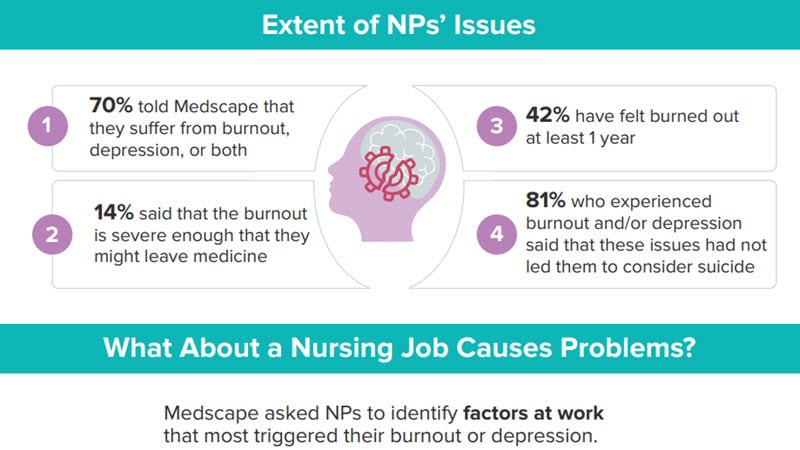Insight into Nurse Practitioners' Mental Health Challenges
Core Concepts
Nurse practitioners face significant challenges with burnout and depression, impacting their well-being and potentially leading to attrition from the medical field.
Abstract
This content explores the prevalent issues of burnout and depression among nurse practitioners (NPs), shedding light on the factors contributing to these challenges and offering coping mechanisms. The Medscape Nurse Practitioner Burnout & Depression Report 2023 is referenced for further insights.
- Nurse practitioners (NPs) experience burnout and depression similar to other medical professionals.
- Over 40% of NPs have felt burned out for at least a year, with some contemplating leaving the medical field.
- The infographic highlights the triggers of burnout and depression among NPs and provides coping strategies.
- The Medscape Nurse Practitioner Burnout & Depression Report 2023 is recommended for more in-depth information.
- Follow Medscape on various social media platforms for updates and additional content.
Customize Summary
Rewrite with AI
Generate Citations
Translate Source
To Another Language
Generate MindMap
from source content
Visit Source
www.medscape.com
Infographic: How Nurses' Mental Health Is Holding Up
Stats
More than 4 in 10 nurse practitioners have felt burned out for at least 1 year.
Quotes
"More than 4 in 10 of them have felt burned out for at least 1 year."
Key Insights Distilled From
by Jon Mckenna at www.medscape.com 08-24-2023
https://www.medscape.com/viewarticle/995654
Deeper Inquiries
How can healthcare institutions better support nurse practitioners facing burnout and depression?
Healthcare institutions can better support nurse practitioners facing burnout and depression by implementing various strategies. Firstly, they can provide access to mental health resources such as counseling services, support groups, and employee assistance programs. Creating a culture that promotes work-life balance, recognizes the signs of burnout, and encourages open communication about mental health issues is crucial. Additionally, offering flexible scheduling, adequate staffing levels, and opportunities for professional development can help prevent burnout and support the overall well-being of nurse practitioners.
What are the potential long-term consequences of high levels of burnout among nurse practitioners?
High levels of burnout among nurse practitioners can have significant long-term consequences on both the individual and the healthcare system. On an individual level, persistent burnout can lead to physical health problems, mental health disorders, decreased job satisfaction, and ultimately, a higher risk of leaving the profession. In the healthcare system, nurse practitioner burnout can result in decreased quality of patient care, increased medical errors, higher turnover rates, and ultimately, a strain on the overall healthcare delivery system.
How can social media platforms be utilized to improve mental health awareness and support for healthcare professionals?
Social media platforms can be utilized to improve mental health awareness and support for healthcare professionals by providing a space for education, resources, and community building. Healthcare institutions can use social media to share information about mental health resources, self-care tips, and coping strategies for dealing with burnout and depression. Additionally, social media can be used to connect healthcare professionals with peer support groups, mental health advocates, and mental health professionals who can provide guidance and support. By leveraging the reach and accessibility of social media, healthcare professionals can access valuable mental health resources and feel less isolated in their struggles.
0
